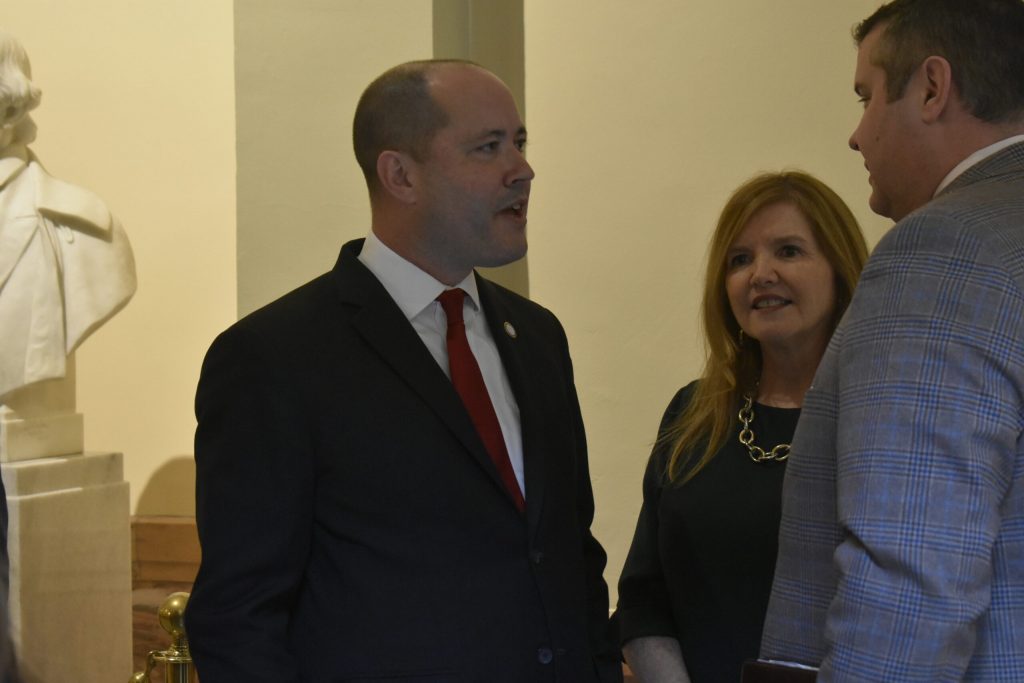Georgia AG shrugs off open records violations but demands local DAs enforce all laws equally

Critics complain state Attorney General Chris Carr’s office isn’t consistently enforcing the Georgia Open Records Act. Ross Williams/Georgia Recorder
When Gov. Brian Kemp signed the GOP-backed Senate Bill 92 in May, he set Georgia on a path to creating something the state had never seen before: a prosecutorial oversight commission with the muscle to shove an elected local district attorney out of public office.
An appointed panel with the discretionary power to remove county prosecutors from office for not pursuing low-level offenses, the commission was aimed at curbing “far-left prosecutors” who were “making our communities less safe,” according to Kemp. Republican Attorney General Chris Carr echoed Kemp’s position, promising to hold local prosecutors accountable.
“All Georgians deserve to be safe, and all crime victims deserve justice,” Carr tweeted, writing that a prosecutor’s refusal to enforce the law was “a dereliction of the law.”
Carr seemed to be singling out local prosecutors from Democratic strongholds across Georgia who vowed they wouldn’t prioritize charging people for violating the state’s new anti-abortion law or for low-level marijuana possession violations.
But does Carr’s office meet his own exacting standards?
From the top, the standard is supposed to be enforcing the law for all crimes at all levels. But some Georgians say Carr’s office hasn’t kept its promise of enforcement when it comes to local government transparency, particularly after Jennifer Colangelo, one of the leaders of that mission left the attorney general’s office a few months ago.
Since 1997, the Department of Law has run an informal mediation program, designed to help citizens get access to the records and meetings the Georgia statutes say they are entitled to. Citizens can file a complaint through the state’s top prosecutor’s online portal. If attorneys at the Department of Law determine there has been a violation of the Open Meetings or Records Act, they will send a “mediation letter” to the local government and give them up to 10 business days to respond. The program was intended as an alternative to litigation to resolve agency disputes.
Sharnya Thrasher, a city employee at the Department of Watershed, tried to use the mediation program to obtain her personnel records from the city of Atlanta because she needed them to research the pay raise process for money she felt she was due in 2021 and 2022 but hadn’t received. When the city took more than three days to respond to her request and failed to deliver the correct records, Thrasher filed a mediation complaint. Assistant Attorney General Kristen Settlemire emailed her back, telling Thrasher to try requesting the records again. The city, again late to respond, sent Thrasher the same incorrect records.
Settlemire stepped in and wrote a letter to the city. Once again, Atlanta provided the same response. When Thrasher wrote to Settlemire to explain that she still hadn’t gotten her records, Settlemire told her the city attorney assured her that the city had fulfilled Thrasher’s request. Thrasher explained the city had not, and Settlemire suggested Thrasher find a private attorney.
“I didn’t understand why Settlemire just turned around and told me to get a private attorney,” Thrasher said. “She just took HR’s word that they gave me everything, so I’m disappointed in the AG.”
Thrasher still hasn’t received the records she asked for and is getting an attorney.
“[Settlemire] said if I had another case to not hesitate to reach out to her and I asked her what’s the point? I’m still at ground zero with nobody to help because she just let it drop,” Thrasher said. “I didn’t get the records that I asked for and she just cut it off, so I’m wondering what is the program that the AG’s supposed to have?”
“What has to happen in order for the attorney general’s office to go forward with this program?” she added.
Reshard Snellings, a resident of South Fulton, requested electronic copies of emails between two city council members and the city manager, planning to post them online to show residents what was happening behind the scenes after a public controversy sowed mistrust between the community and city government.
“These two city council people – they forced our city manager out of her position,” Snellings said. “I just wanted to let the public know what was going on behind the scenes.”
In response to his request, the city of South Fulton charged him $387.63 and notified him of the charge 30 days after his request, contrary to the three business days the open records law requires for a response. He wrote to the attorney general’s office to enlist help in obtaining the records.
“What they’ll always do, because I’ve complained a lot of times to the AG’s office, is they send a letter to the city, they let the city respond back and then it’s closed. No further action was taken,” he said.
When Snellings wrote to Carr’s office, complaining that he still hadn’t received the records he needed, they told him there was nothing more they could do because their goal was only to open up communication between the parties.
With assistance from the Georgia First Amendment Foundation, Snellings wrote to Carr’s office again to ask for help. In response, the AG’s office sent a mediation letter to the city attorney, giving South Fulton officials the opportunity to explain themselves.
The city continued asking for $387.63 for a week’s worth of emails, which Snellings called “exorbitant.” Settlemire told him to hire an attorney out of his own pocket, which Snellings did, filing a lawsuit against South Fulton.
“I have wasted a lot of time and money trying to get these records from the city of South Fulton,” Snellings said. “I can’t get the records because they won’t follow the law and the attorney general’s office will not enforce the law.”
Assistant Attorney General Settlemire said in a forwarded statement that if a local government’s attorney tells the AG’s office that they have provided records and the complainant disagrees or provides a “reasonable explanation” for relying on a particular disclosure exception, she suggests the complainant hire private counsel.
“These are disputes that we cannot continue to mediate, largely because our mediation program does not have the same jurisdiction and authority that a court does,” she said. “We also do not have the authority or jurisdiction to conduct an in camera inspection of records where an exemption is being relied upon – only a court can do that. Per the Open Records Act and Open Meetings Act, any person may file a private suit related to alleged noncompliance.”
Joy Ramsingh, a government transparency attorney with Ramsingh Legal firm in middle Georgia, is one of the attorneys receiving the complaints the attorney general’s office redirected to private practice. People usually reach out to the attorney general’s office for help before contacting her firm because it is the only free enforcement resource available, Ramsingh said.
“The way that the attorney general presents itself to the public is that you don’t need an attorney or anyone to help you with the process. You can just get online and file a complaint yourself,” she said. “Every person that has come to me has advised me that they have not had any success with that avenue.”
“The resources just don’t exist for requesters to be able to file a lawsuit every time their request gets denied,” she added. “If that person could afford an attorney, they would start there. There’s a reason why they’re calling the free enforcement resource for the public as opposed to a private attorney.”
Legal fellow with the Georgia First Amendment Clinic Allyson Veile said Memorandums of Understanding, a public negotiation memo between the AG’s office and the agency violating the Open Meetings or Records Act where the agency admits the violation and promises corrective action, haven’t been posted publicly on the AG’s website since 2016. Carr, a long-time government worker, was appointed attorney general in 2016 and subsequently won statewide elections to keep the position.
“I’m also not aware of any official or unofficial attorney general opinions that have been issued on the open records act since 2012,” she added. “Those are opinions that the office of the attorney general can issue through the AG’s website providing an official interpretation of the law from the AG’s office.”
Carl Appen, director of Content and Development for Appen Media online news outlets, has used the mediation program multiple times to get access to records for his reporting. Appen said he used to have a good relationship with Colangelo, who was in charge of the mediation program until this summer when she stepped down and Settlemire took over.
“It has been really, really, really disappointing how much of a difference we have seen before and after Jennifer’s departure,” Appen said.
Citing a general unresponsiveness, Appen said that of the approximately dozen times he has reached out to the AG’s office since Colangelo left, he has only received one response back from Settlemire, who told him she was unable to help in that situation. He reached out several times after to ask why they were unable to help, but received no further communication from Settlemire. Almost all of the dozen requests to Settlemire were issues Colangelo had responded to in the past, Appen said.
“Very obviously, their practices are not following the spirit of the open records law,” he added. “Seeing that indicated to me that they genuinely were just looking for a solution. They were not trying to check the box and say that they had this mediation office that wasn’t actually doing anything.”
Colangelo declined comment.
With 159 counties in the state of Georgia, the potential for open records violations is high. Settlemire said in a statement that Carr’s office receives requests for mediation almost daily.
Assigning one person to handle the entire mediation program, Ramsingh said, is like “trying to empty the ocean with a teaspoon” and “even the best intentioned human being could not do this job alone.”
The attorney general has an obligation to individual citizens, Ramsingh said, but also to the state at large.
“It benefits the state government itself to ensure that state and local government branches are being held accountable to the people that they serve,” she said. “The public records act is only as good as the teeth that’s in it.”
Snellings expressed disappointment in the AG’s performance, saying he expected more from his elected officials.
“I expect them to enforce the law each and every time,” he said. “Not just pick when they want to enforce it and when they do not want to enforce it.”
SUPPORT NEWS YOU TRUST.
The post Georgia AG shrugs off open records violations but demands local DAs enforce all laws equally appeared first on Georgia Recorder.




